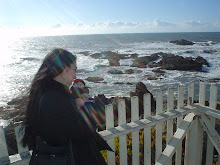I hope you enjoy the following three haiku I wrote about the cranes, and then another haiku by someone. The general haiku form is 5-7-5 syllables. I have provided a brief translation next to each line of my haiku and more explanation under each haiku.
北海道 Hokkaido ([In] the Northernmost island of Japan)
丹頂の里は Tancho no sato wa (the home of the Tancho cranes)
何処やら Izuko yara (is where?)
For my Japan trip, I held the map of Hakkaido many times. It is a big square island slightly rotated. Kushiro, in the southeast, is the home of Tancho cranes.
初夢か Hatsuyume ka (Was that a New Year Day's dream)
丹頂を愛でる Tancho wo mederu (to admire the Tancho cranes)
里帰り Satogaeri (returning to my birthplace?)
"Hatsuyume" means first dream. It refers to the dream people have on New Year's Day or the 2nd of January. Japanese often discuss what they dreamed about and what it might mean. Certain dreams are considered auspicious. Returning to Japan and admiring the cranes on New Year's Day was a dream-like experience. That might have been my "hatsuyume."
寒かろう Samukarou (It must be cold.)
鶴に引かれる Tsuru ni hikareru (Pulled by the cranes)
後ろ髪 Ushirogami (is my back hair.)
This haiku expresses my concern for the cranes. A while ago, a friend reported that Japan has gotten much colder and that Sapporo, the capital of Hokkaido, was minus 30 degrees C (not F). I worried about the cranes in Kushiro. "Ushirogami" (my back hair) comes from the expression "ushirogami wo hikareru" meaning "feel as if one's heart were left behind" or "find it hard to tear oneself away from someone or something." I've had this feeling since I returned to the U.S. It's as if my long hair has been pulled from behind by the cranes.
Now, here is the haiku someone shared.
Kushiro in white winter
The great cranes' cries
Like ice breaking
© Don Skiles
When I read this haiku, I hear the cranes' voices through the frozen air, echoing the creaky sound of slowly breaking ice. This haiku adds an auditory dimension to my haiku, which is mostly visual. It also makes me feel as if the cranes are responding to my haiku, as in their duet. My former English teacher, who wrote the poetic comment about my trip (posted below), happens to be a prolific haiku writer. Mr. Skiles guessed that I would receive haiku in response since that is in the tradition of haiku--a conversation. I certainly look forward to receiving more haiku from any and all of the readers of my blog.
Copyright © 2008
Saturday, February 9, 2008
Subscribe to:
Post Comments (Atom)




No comments:
Post a Comment